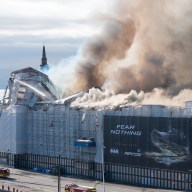By Roberta Rampton and Mitra Taj
LIMA (Reuters) – Latin American leaders met in Peru for a regional summit on Friday that was overshadowed by Washington’s decision to order military strikes on Syria, prompting U.S. Vice President Mike Pence to abruptly leave the opening ceremony.
Pence had been sent to the Summit of the Americas in the capital, Lima, in place of President Donald Trump, who decided to focus on a response to a suspected poison gas attack in Syria that killed at least 60 people last week.
But as the summit began late on Friday, Pence cut short his participation to race to his hotel, arriving in time to make secure calls to Republican and Democratic congressional leaders before the strikes started.
Within an hour, the attacks had ended and Pence planned to return to a banquet at Peru’s presidential palace with other leaders from the region.
Despite Trump’s absence, U.S. officials sought to use the summit to counter China’s rising influence in Latin America and condemn Venezuela’s government.
Syria is also on the agenda now. Pence’s deputy chief of staff, Jarrod Agen, told Reuters he planned to discuss the strikes in his speech on Saturday and in meetings with leaders.
Earlier on Friday, Pence met Venezuelan opposition leaders and announced $16 million in aid to help Venezuelan migrants who have fled their country’s severe economic crisis.
A dozen countries in the region have already been turning up the pressure on socialist Venezuelan President Nicolas Maduro, and are expected to back a statement on the sidelines of the summit condemning the widely-criticized May 20 election.
But there was less agreement with Washington on trade.
Chile’s President Sebastian Pinera, part of a conservative shift in South America in recent years, recalled how free trade was celebrated across the region at the first Summit of the Americas in 1994.
“Today, we have the president of the United States facing a trade war with China and other countries,” Pinera said on a panel at a joint business summit on Friday.
‘TRUMP IS A FREE TRADER’
The trade dispute between Beijing and Washington spilled over into Latin America this week. In Lima, U.S. Commerce Secretary Wilbur Ross took aim at China’s growing ties and vowed Washington would not cede leadership in the region.
But Ross also said Washington wants Latin American nations to do more to reduce trade barriers.
“President Trump is a free trader. But free trade has to be fair, it has to be reciprocal, it has to be real,” Ross told a press conference Friday. “We’re eager to get closer to free trade and to have people’s behavior match the rhetoric.”
Ross said he was “optimistic” there would be an agreement on the North American Free Trade Agreement (NAFTA), possibly in May.
In a sign of possible progress toward that goal, Pence and Mexican President Enrique Pena Nieto scheduled a one-on-one meeting on Saturday.
But some business and political leaders gathered in Lima for the summit said Trump’s message on Latin America, and trade, was confusing.
On Thursday, Trump ordered his top economic advisers to study rejoining the TPP, a multilateral trade deal he once called the “rape” of the country that he withdrew the United States from last year in one of his first acts as president.
In January, Trump also flirted with a return to the TPP, or Trans Pacific Partnership, if he could get better terms.
Mexico’s Economy Minister Ildefonso Guajardo said he took Trump’s latest signals on TPP “very seriously,” telling journalists he thought Washington might have had a change of heart.
But Guajardo stopped short of outright optimism. “With this kind of thing you can’t be hopeful, you just have to be ready for any opportunity,” he said.
Under former U.S. President Barack Obama, the TPP had been pitched as a way to secure an edge over China in a fast-growing region that includes large swaths of Latin America.
(Reporting by Roberta Rampton and Mitra Taj; Editing by Daniel Flynn and Clarence Fernandez)
















